Parenting Disabled Children: Challenges and Solutions
VerifiedAdded on 2022/11/13
|10
|2994
|66
Essay
AI Summary
This essay, focusing on community service, delves into the multifaceted challenges faced by parents of disabled children. It defines disability, highlighting the difficulties in accessing knowledge, financial constraints, and emotional burdens. The essay explores the impact on parents' well-being and their interactions within the community. It examines barriers like lack of knowledge, difficulties in accessing resources, and the emotional toll on parents. The essay further discusses the social model of disability, contrasting it with the medical model and advocating for societal changes to reduce discrimination. It also provides potential solutions through community service, including therapy sessions, parenting classes, and positive behavior support programs. The essay emphasizes the importance of understanding children's characteristics and promoting positive social interactions. The essay also highlights the historical context of the disability rights movement and advocates for a shift in perspective, emphasizing the need for societal adaptation rather than individual adaptation. The essay draws from various research papers and concludes by underscoring the need for financial stability, knowledge, and support for parents of disabled children.
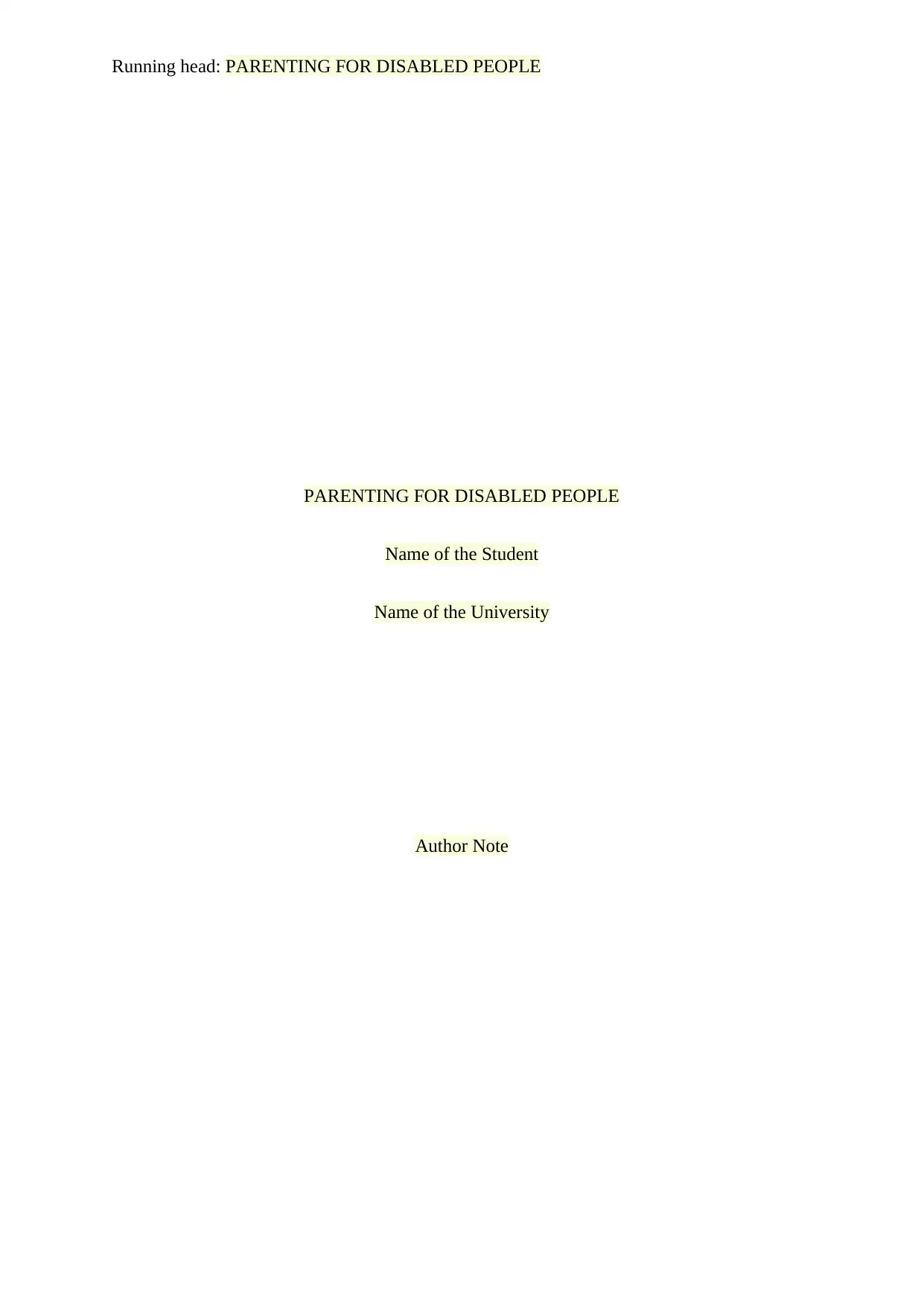
Running head: PARENTING FOR DISABLED PEOPLE
PARENTING FOR DISABLED PEOPLE
Name of the Student
Name of the University
Author Note
PARENTING FOR DISABLED PEOPLE
Name of the Student
Name of the University
Author Note
Paraphrase This Document
Need a fresh take? Get an instant paraphrase of this document with our AI Paraphraser
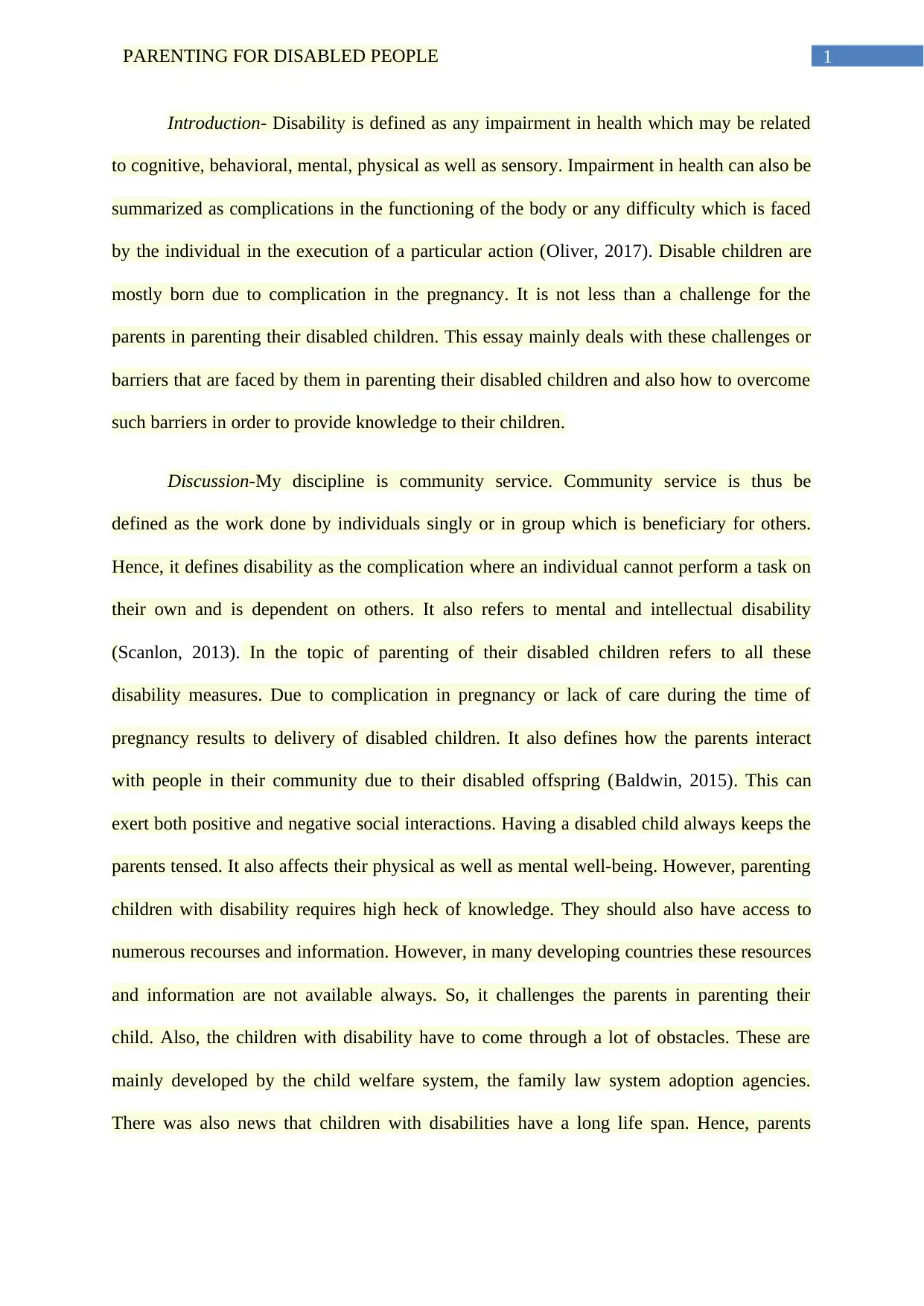
1PARENTING FOR DISABLED PEOPLE
Introduction- Disability is defined as any impairment in health which may be related
to cognitive, behavioral, mental, physical as well as sensory. Impairment in health can also be
summarized as complications in the functioning of the body or any difficulty which is faced
by the individual in the execution of a particular action (Oliver, 2017). Disable children are
mostly born due to complication in the pregnancy. It is not less than a challenge for the
parents in parenting their disabled children. This essay mainly deals with these challenges or
barriers that are faced by them in parenting their disabled children and also how to overcome
such barriers in order to provide knowledge to their children.
Discussion-My discipline is community service. Community service is thus be
defined as the work done by individuals singly or in group which is beneficiary for others.
Hence, it defines disability as the complication where an individual cannot perform a task on
their own and is dependent on others. It also refers to mental and intellectual disability
(Scanlon, 2013). In the topic of parenting of their disabled children refers to all these
disability measures. Due to complication in pregnancy or lack of care during the time of
pregnancy results to delivery of disabled children. It also defines how the parents interact
with people in their community due to their disabled offspring (Baldwin, 2015). This can
exert both positive and negative social interactions. Having a disabled child always keeps the
parents tensed. It also affects their physical as well as mental well-being. However, parenting
children with disability requires high heck of knowledge. They should also have access to
numerous recourses and information. However, in many developing countries these resources
and information are not available always. So, it challenges the parents in parenting their
child. Also, the children with disability have to come through a lot of obstacles. These are
mainly developed by the child welfare system, the family law system adoption agencies.
There was also news that children with disabilities have a long life span. Hence, parents
Introduction- Disability is defined as any impairment in health which may be related
to cognitive, behavioral, mental, physical as well as sensory. Impairment in health can also be
summarized as complications in the functioning of the body or any difficulty which is faced
by the individual in the execution of a particular action (Oliver, 2017). Disable children are
mostly born due to complication in the pregnancy. It is not less than a challenge for the
parents in parenting their disabled children. This essay mainly deals with these challenges or
barriers that are faced by them in parenting their disabled children and also how to overcome
such barriers in order to provide knowledge to their children.
Discussion-My discipline is community service. Community service is thus be
defined as the work done by individuals singly or in group which is beneficiary for others.
Hence, it defines disability as the complication where an individual cannot perform a task on
their own and is dependent on others. It also refers to mental and intellectual disability
(Scanlon, 2013). In the topic of parenting of their disabled children refers to all these
disability measures. Due to complication in pregnancy or lack of care during the time of
pregnancy results to delivery of disabled children. It also defines how the parents interact
with people in their community due to their disabled offspring (Baldwin, 2015). This can
exert both positive and negative social interactions. Having a disabled child always keeps the
parents tensed. It also affects their physical as well as mental well-being. However, parenting
children with disability requires high heck of knowledge. They should also have access to
numerous recourses and information. However, in many developing countries these resources
and information are not available always. So, it challenges the parents in parenting their
child. Also, the children with disability have to come through a lot of obstacles. These are
mainly developed by the child welfare system, the family law system adoption agencies.
There was also news that children with disabilities have a long life span. Hence, parents
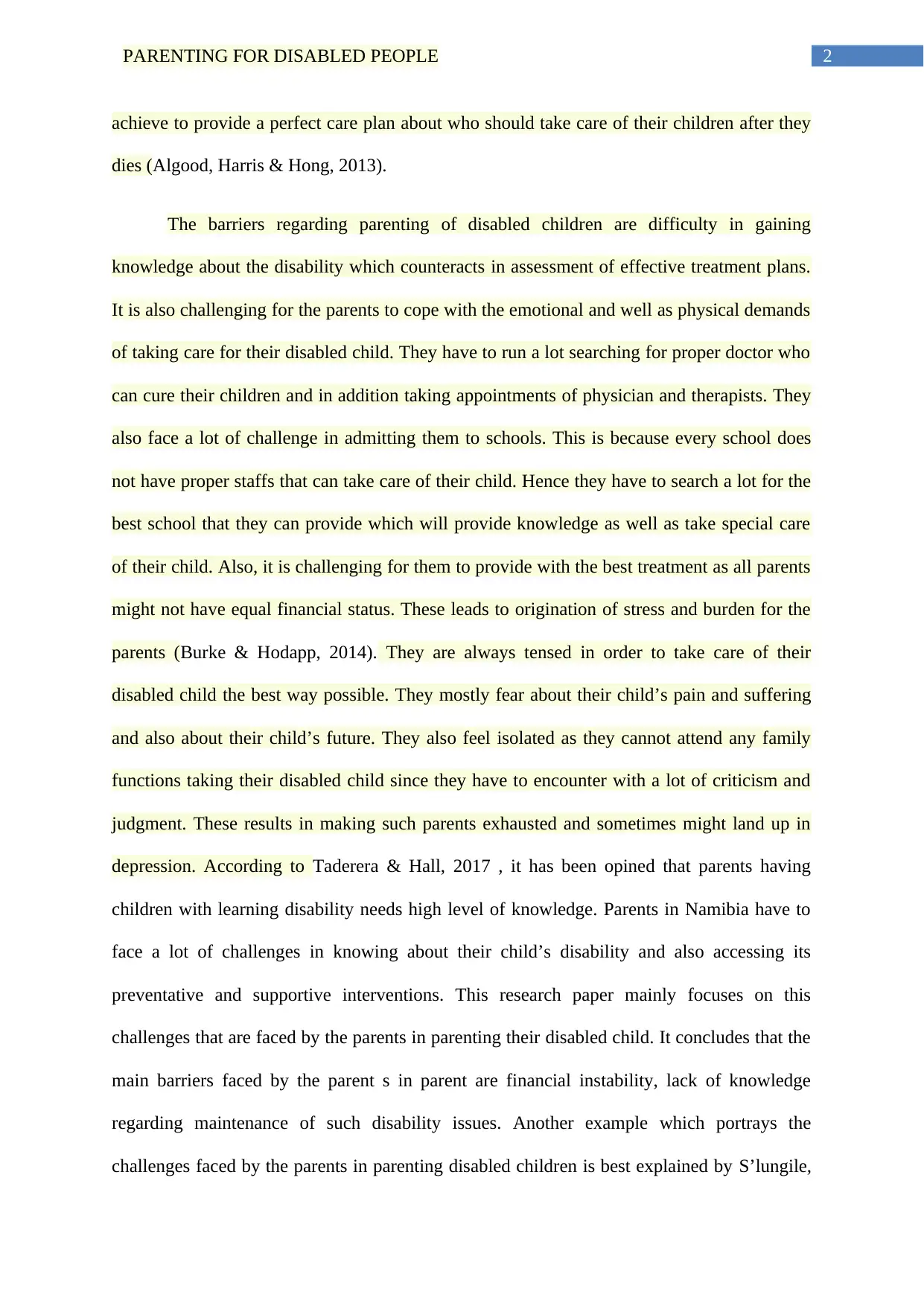
2PARENTING FOR DISABLED PEOPLE
achieve to provide a perfect care plan about who should take care of their children after they
dies (Algood, Harris & Hong, 2013).
The barriers regarding parenting of disabled children are difficulty in gaining
knowledge about the disability which counteracts in assessment of effective treatment plans.
It is also challenging for the parents to cope with the emotional and well as physical demands
of taking care for their disabled child. They have to run a lot searching for proper doctor who
can cure their children and in addition taking appointments of physician and therapists. They
also face a lot of challenge in admitting them to schools. This is because every school does
not have proper staffs that can take care of their child. Hence they have to search a lot for the
best school that they can provide which will provide knowledge as well as take special care
of their child. Also, it is challenging for them to provide with the best treatment as all parents
might not have equal financial status. These leads to origination of stress and burden for the
parents (Burke & Hodapp, 2014). They are always tensed in order to take care of their
disabled child the best way possible. They mostly fear about their child’s pain and suffering
and also about their child’s future. They also feel isolated as they cannot attend any family
functions taking their disabled child since they have to encounter with a lot of criticism and
judgment. These results in making such parents exhausted and sometimes might land up in
depression. According to Taderera & Hall, 2017 , it has been opined that parents having
children with learning disability needs high level of knowledge. Parents in Namibia have to
face a lot of challenges in knowing about their child’s disability and also accessing its
preventative and supportive interventions. This research paper mainly focuses on this
challenges that are faced by the parents in parenting their disabled child. It concludes that the
main barriers faced by the parent s in parent are financial instability, lack of knowledge
regarding maintenance of such disability issues. Another example which portrays the
challenges faced by the parents in parenting disabled children is best explained by S’lungile,
achieve to provide a perfect care plan about who should take care of their children after they
dies (Algood, Harris & Hong, 2013).
The barriers regarding parenting of disabled children are difficulty in gaining
knowledge about the disability which counteracts in assessment of effective treatment plans.
It is also challenging for the parents to cope with the emotional and well as physical demands
of taking care for their disabled child. They have to run a lot searching for proper doctor who
can cure their children and in addition taking appointments of physician and therapists. They
also face a lot of challenge in admitting them to schools. This is because every school does
not have proper staffs that can take care of their child. Hence they have to search a lot for the
best school that they can provide which will provide knowledge as well as take special care
of their child. Also, it is challenging for them to provide with the best treatment as all parents
might not have equal financial status. These leads to origination of stress and burden for the
parents (Burke & Hodapp, 2014). They are always tensed in order to take care of their
disabled child the best way possible. They mostly fear about their child’s pain and suffering
and also about their child’s future. They also feel isolated as they cannot attend any family
functions taking their disabled child since they have to encounter with a lot of criticism and
judgment. These results in making such parents exhausted and sometimes might land up in
depression. According to Taderera & Hall, 2017 , it has been opined that parents having
children with learning disability needs high level of knowledge. Parents in Namibia have to
face a lot of challenges in knowing about their child’s disability and also accessing its
preventative and supportive interventions. This research paper mainly focuses on this
challenges that are faced by the parents in parenting their disabled child. It concludes that the
main barriers faced by the parent s in parent are financial instability, lack of knowledge
regarding maintenance of such disability issues. Another example which portrays the
challenges faced by the parents in parenting disabled children is best explained by S’lungile,
⊘ This is a preview!⊘
Do you want full access?
Subscribe today to unlock all pages.

Trusted by 1+ million students worldwide
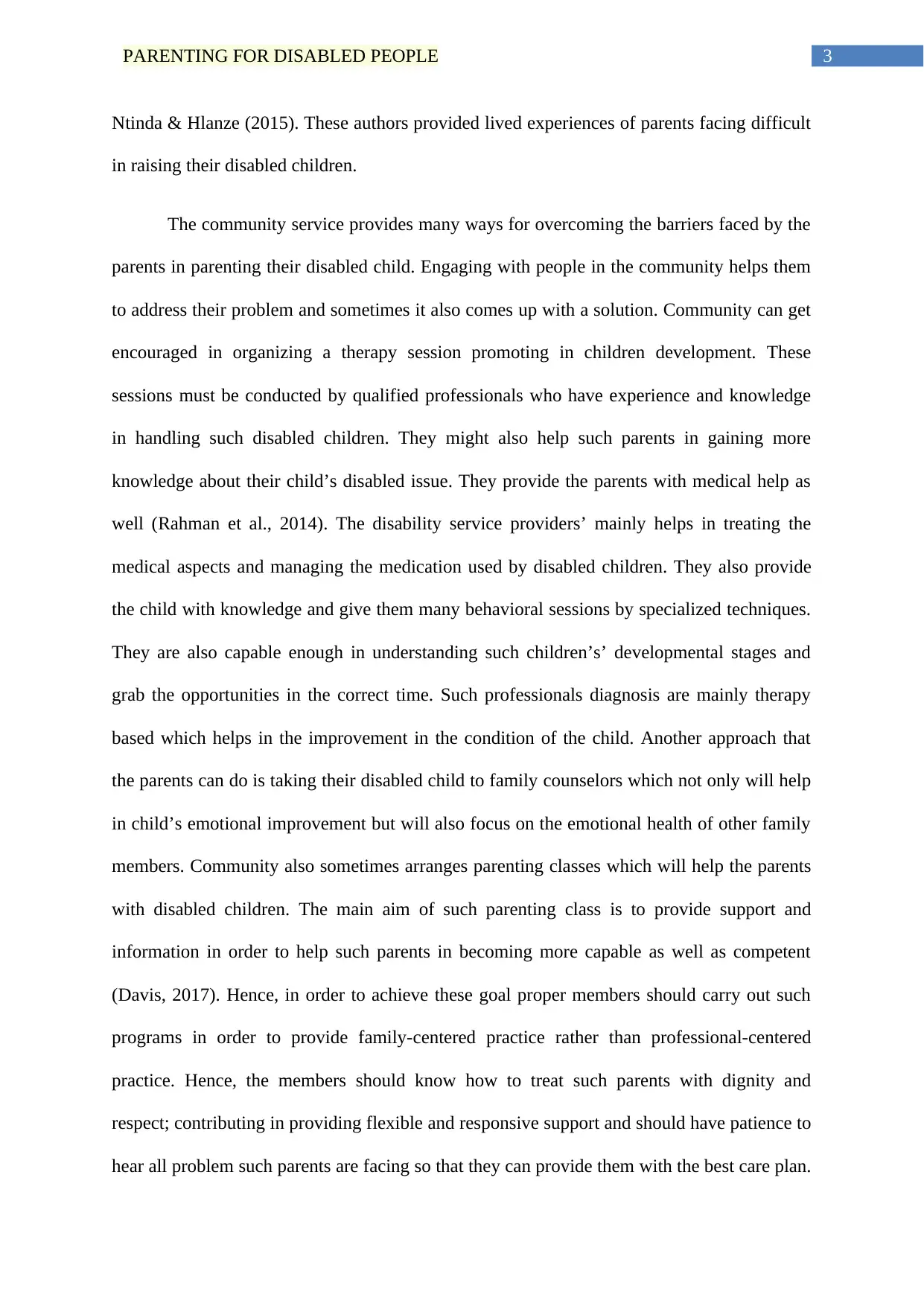
3PARENTING FOR DISABLED PEOPLE
Ntinda & Hlanze (2015). These authors provided lived experiences of parents facing difficult
in raising their disabled children.
The community service provides many ways for overcoming the barriers faced by the
parents in parenting their disabled child. Engaging with people in the community helps them
to address their problem and sometimes it also comes up with a solution. Community can get
encouraged in organizing a therapy session promoting in children development. These
sessions must be conducted by qualified professionals who have experience and knowledge
in handling such disabled children. They might also help such parents in gaining more
knowledge about their child’s disabled issue. They provide the parents with medical help as
well (Rahman et al., 2014). The disability service providers’ mainly helps in treating the
medical aspects and managing the medication used by disabled children. They also provide
the child with knowledge and give them many behavioral sessions by specialized techniques.
They are also capable enough in understanding such children’s’ developmental stages and
grab the opportunities in the correct time. Such professionals diagnosis are mainly therapy
based which helps in the improvement in the condition of the child. Another approach that
the parents can do is taking their disabled child to family counselors which not only will help
in child’s emotional improvement but will also focus on the emotional health of other family
members. Community also sometimes arranges parenting classes which will help the parents
with disabled children. The main aim of such parenting class is to provide support and
information in order to help such parents in becoming more capable as well as competent
(Davis, 2017). Hence, in order to achieve these goal proper members should carry out such
programs in order to provide family-centered practice rather than professional-centered
practice. Hence, the members should know how to treat such parents with dignity and
respect; contributing in providing flexible and responsive support and should have patience to
hear all problem such parents are facing so that they can provide them with the best care plan.
Ntinda & Hlanze (2015). These authors provided lived experiences of parents facing difficult
in raising their disabled children.
The community service provides many ways for overcoming the barriers faced by the
parents in parenting their disabled child. Engaging with people in the community helps them
to address their problem and sometimes it also comes up with a solution. Community can get
encouraged in organizing a therapy session promoting in children development. These
sessions must be conducted by qualified professionals who have experience and knowledge
in handling such disabled children. They might also help such parents in gaining more
knowledge about their child’s disabled issue. They provide the parents with medical help as
well (Rahman et al., 2014). The disability service providers’ mainly helps in treating the
medical aspects and managing the medication used by disabled children. They also provide
the child with knowledge and give them many behavioral sessions by specialized techniques.
They are also capable enough in understanding such children’s’ developmental stages and
grab the opportunities in the correct time. Such professionals diagnosis are mainly therapy
based which helps in the improvement in the condition of the child. Another approach that
the parents can do is taking their disabled child to family counselors which not only will help
in child’s emotional improvement but will also focus on the emotional health of other family
members. Community also sometimes arranges parenting classes which will help the parents
with disabled children. The main aim of such parenting class is to provide support and
information in order to help such parents in becoming more capable as well as competent
(Davis, 2017). Hence, in order to achieve these goal proper members should carry out such
programs in order to provide family-centered practice rather than professional-centered
practice. Hence, the members should know how to treat such parents with dignity and
respect; contributing in providing flexible and responsive support and should have patience to
hear all problem such parents are facing so that they can provide them with the best care plan.
Paraphrase This Document
Need a fresh take? Get an instant paraphrase of this document with our AI Paraphraser
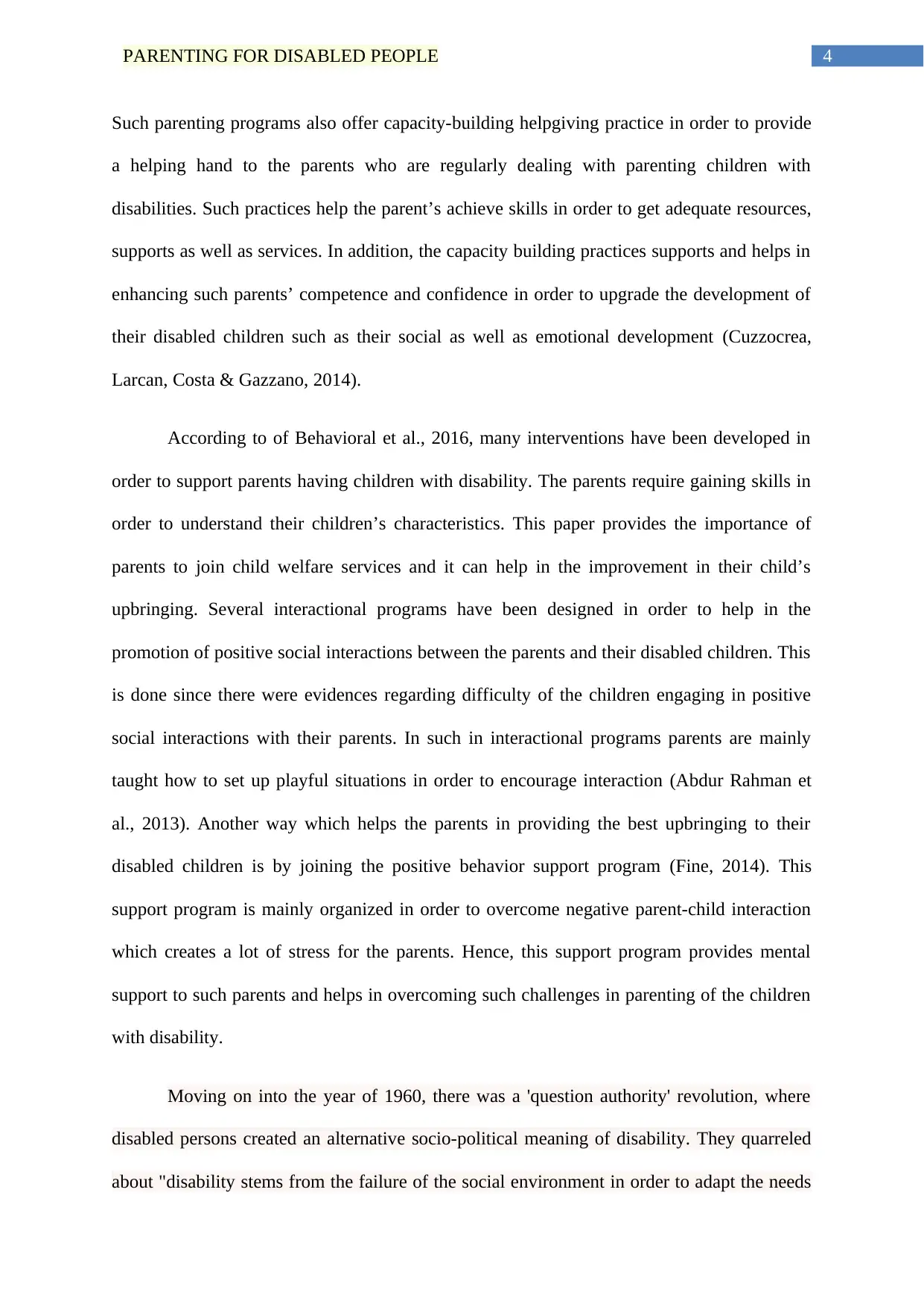
4PARENTING FOR DISABLED PEOPLE
Such parenting programs also offer capacity-building helpgiving practice in order to provide
a helping hand to the parents who are regularly dealing with parenting children with
disabilities. Such practices help the parent’s achieve skills in order to get adequate resources,
supports as well as services. In addition, the capacity building practices supports and helps in
enhancing such parents’ competence and confidence in order to upgrade the development of
their disabled children such as their social as well as emotional development (Cuzzocrea,
Larcan, Costa & Gazzano, 2014).
According to of Behavioral et al., 2016, many interventions have been developed in
order to support parents having children with disability. The parents require gaining skills in
order to understand their children’s characteristics. This paper provides the importance of
parents to join child welfare services and it can help in the improvement in their child’s
upbringing. Several interactional programs have been designed in order to help in the
promotion of positive social interactions between the parents and their disabled children. This
is done since there were evidences regarding difficulty of the children engaging in positive
social interactions with their parents. In such in interactional programs parents are mainly
taught how to set up playful situations in order to encourage interaction (Abdur Rahman et
al., 2013). Another way which helps the parents in providing the best upbringing to their
disabled children is by joining the positive behavior support program (Fine, 2014). This
support program is mainly organized in order to overcome negative parent-child interaction
which creates a lot of stress for the parents. Hence, this support program provides mental
support to such parents and helps in overcoming such challenges in parenting of the children
with disability.
Moving on into the year of 1960, there was a 'question authority' revolution, where
disabled persons created an alternative socio-political meaning of disability. They quarreled
about "disability stems from the failure of the social environment in order to adapt the needs
Such parenting programs also offer capacity-building helpgiving practice in order to provide
a helping hand to the parents who are regularly dealing with parenting children with
disabilities. Such practices help the parent’s achieve skills in order to get adequate resources,
supports as well as services. In addition, the capacity building practices supports and helps in
enhancing such parents’ competence and confidence in order to upgrade the development of
their disabled children such as their social as well as emotional development (Cuzzocrea,
Larcan, Costa & Gazzano, 2014).
According to of Behavioral et al., 2016, many interventions have been developed in
order to support parents having children with disability. The parents require gaining skills in
order to understand their children’s characteristics. This paper provides the importance of
parents to join child welfare services and it can help in the improvement in their child’s
upbringing. Several interactional programs have been designed in order to help in the
promotion of positive social interactions between the parents and their disabled children. This
is done since there were evidences regarding difficulty of the children engaging in positive
social interactions with their parents. In such in interactional programs parents are mainly
taught how to set up playful situations in order to encourage interaction (Abdur Rahman et
al., 2013). Another way which helps the parents in providing the best upbringing to their
disabled children is by joining the positive behavior support program (Fine, 2014). This
support program is mainly organized in order to overcome negative parent-child interaction
which creates a lot of stress for the parents. Hence, this support program provides mental
support to such parents and helps in overcoming such challenges in parenting of the children
with disability.
Moving on into the year of 1960, there was a 'question authority' revolution, where
disabled persons created an alternative socio-political meaning of disability. They quarreled
about "disability stems from the failure of the social environment in order to adapt the needs
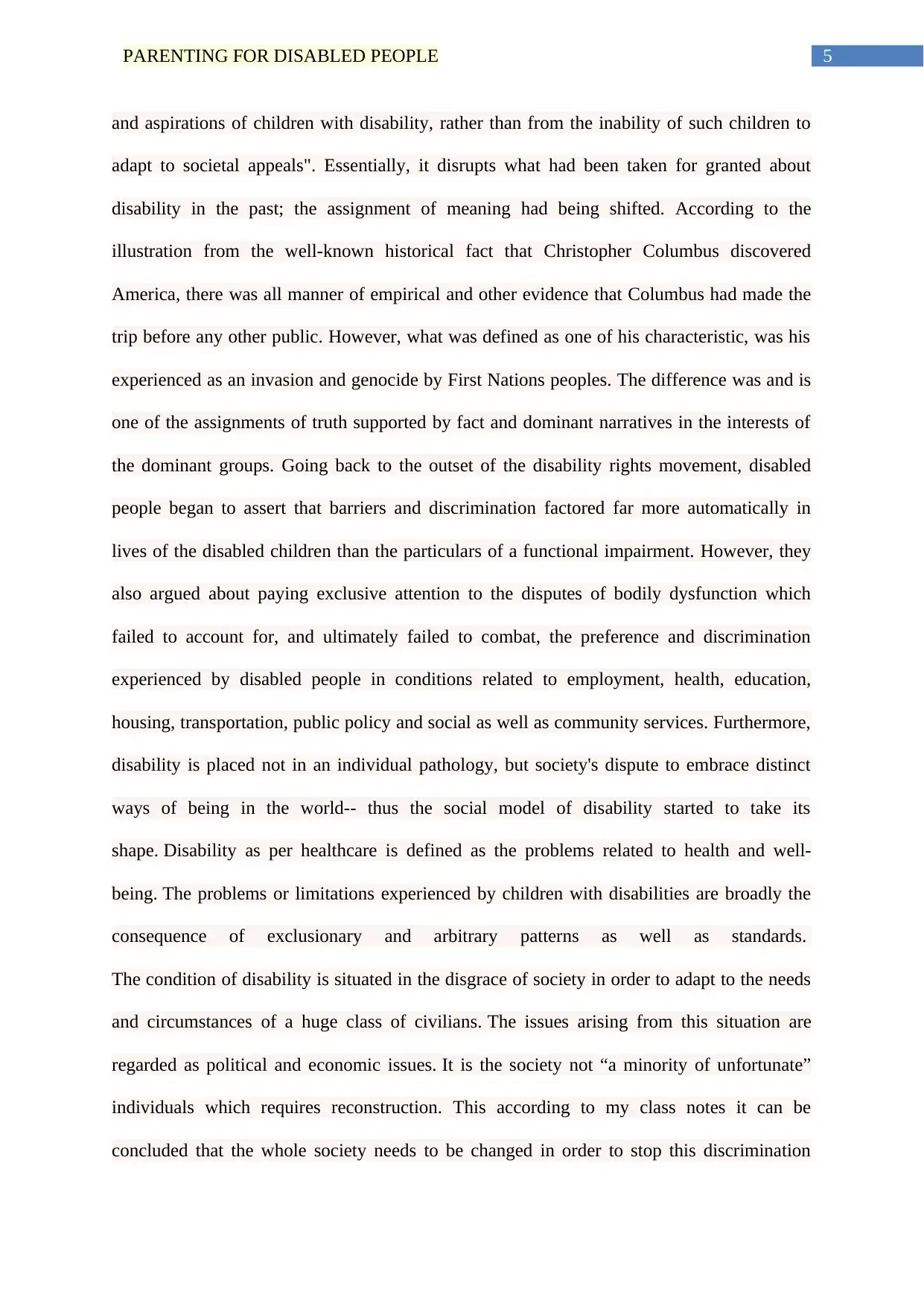
5PARENTING FOR DISABLED PEOPLE
and aspirations of children with disability, rather than from the inability of such children to
adapt to societal appeals". Essentially, it disrupts what had been taken for granted about
disability in the past; the assignment of meaning had being shifted. According to the
illustration from the well-known historical fact that Christopher Columbus discovered
America, there was all manner of empirical and other evidence that Columbus had made the
trip before any other public. However, what was defined as one of his characteristic, was his
experienced as an invasion and genocide by First Nations peoples. The difference was and is
one of the assignments of truth supported by fact and dominant narratives in the interests of
the dominant groups. Going back to the outset of the disability rights movement, disabled
people began to assert that barriers and discrimination factored far more automatically in
lives of the disabled children than the particulars of a functional impairment. However, they
also argued about paying exclusive attention to the disputes of bodily dysfunction which
failed to account for, and ultimately failed to combat, the preference and discrimination
experienced by disabled people in conditions related to employment, health, education,
housing, transportation, public policy and social as well as community services. Furthermore,
disability is placed not in an individual pathology, but society's dispute to embrace distinct
ways of being in the world-- thus the social model of disability started to take its
shape. Disability as per healthcare is defined as the problems related to health and well-
being. The problems or limitations experienced by children with disabilities are broadly the
consequence of exclusionary and arbitrary patterns as well as standards.
The condition of disability is situated in the disgrace of society in order to adapt to the needs
and circumstances of a huge class of civilians. The issues arising from this situation are
regarded as political and economic issues. It is the society not “a minority of unfortunate”
individuals which requires reconstruction. This according to my class notes it can be
concluded that the whole society needs to be changed in order to stop this discrimination
and aspirations of children with disability, rather than from the inability of such children to
adapt to societal appeals". Essentially, it disrupts what had been taken for granted about
disability in the past; the assignment of meaning had being shifted. According to the
illustration from the well-known historical fact that Christopher Columbus discovered
America, there was all manner of empirical and other evidence that Columbus had made the
trip before any other public. However, what was defined as one of his characteristic, was his
experienced as an invasion and genocide by First Nations peoples. The difference was and is
one of the assignments of truth supported by fact and dominant narratives in the interests of
the dominant groups. Going back to the outset of the disability rights movement, disabled
people began to assert that barriers and discrimination factored far more automatically in
lives of the disabled children than the particulars of a functional impairment. However, they
also argued about paying exclusive attention to the disputes of bodily dysfunction which
failed to account for, and ultimately failed to combat, the preference and discrimination
experienced by disabled people in conditions related to employment, health, education,
housing, transportation, public policy and social as well as community services. Furthermore,
disability is placed not in an individual pathology, but society's dispute to embrace distinct
ways of being in the world-- thus the social model of disability started to take its
shape. Disability as per healthcare is defined as the problems related to health and well-
being. The problems or limitations experienced by children with disabilities are broadly the
consequence of exclusionary and arbitrary patterns as well as standards.
The condition of disability is situated in the disgrace of society in order to adapt to the needs
and circumstances of a huge class of civilians. The issues arising from this situation are
regarded as political and economic issues. It is the society not “a minority of unfortunate”
individuals which requires reconstruction. This according to my class notes it can be
concluded that the whole society needs to be changed in order to stop this discrimination
⊘ This is a preview!⊘
Do you want full access?
Subscribe today to unlock all pages.

Trusted by 1+ million students worldwide
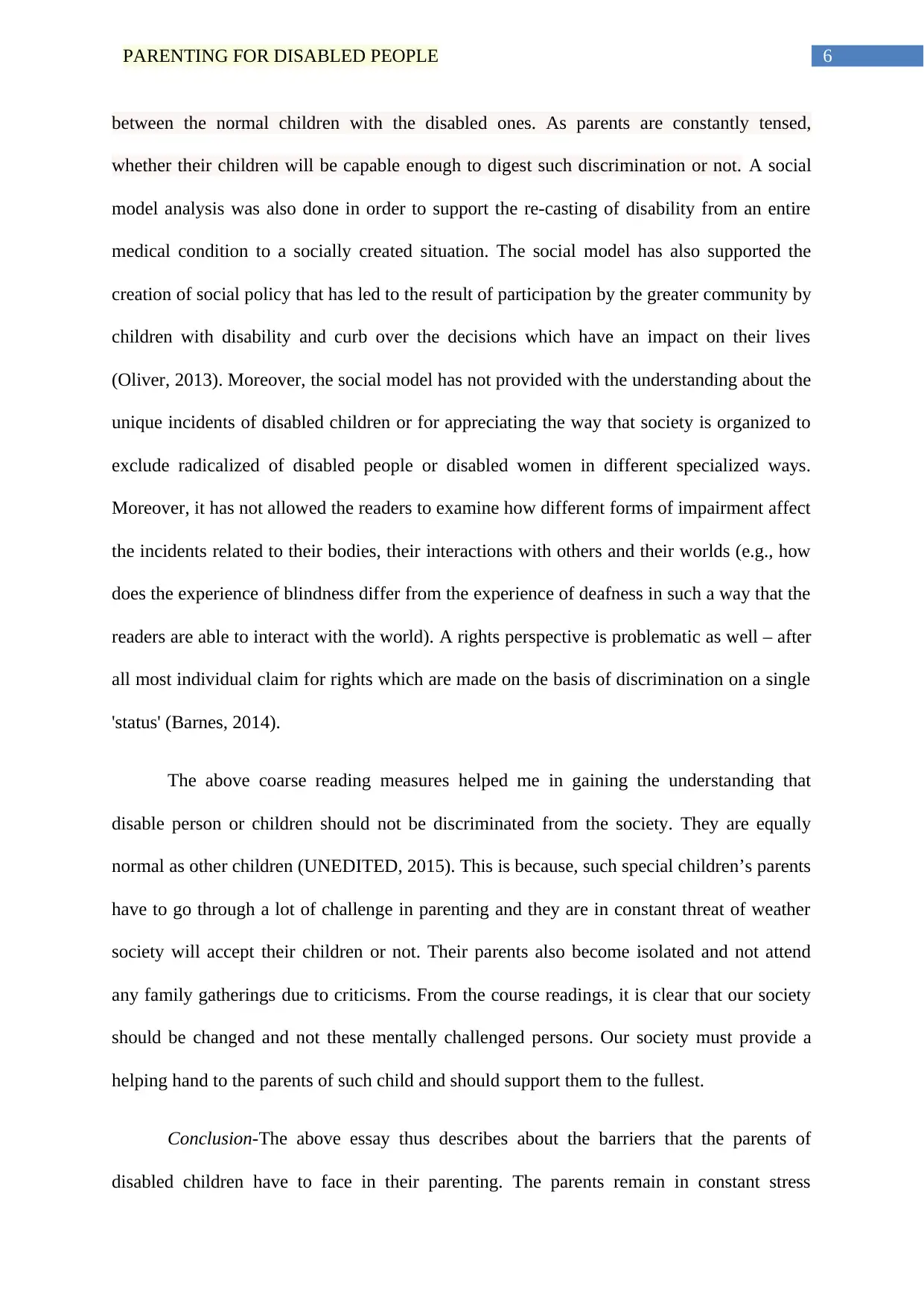
6PARENTING FOR DISABLED PEOPLE
between the normal children with the disabled ones. As parents are constantly tensed,
whether their children will be capable enough to digest such discrimination or not. A social
model analysis was also done in order to support the re-casting of disability from an entire
medical condition to a socially created situation. The social model has also supported the
creation of social policy that has led to the result of participation by the greater community by
children with disability and curb over the decisions which have an impact on their lives
(Oliver, 2013). Moreover, the social model has not provided with the understanding about the
unique incidents of disabled children or for appreciating the way that society is organized to
exclude radicalized of disabled people or disabled women in different specialized ways.
Moreover, it has not allowed the readers to examine how different forms of impairment affect
the incidents related to their bodies, their interactions with others and their worlds (e.g., how
does the experience of blindness differ from the experience of deafness in such a way that the
readers are able to interact with the world). A rights perspective is problematic as well – after
all most individual claim for rights which are made on the basis of discrimination on a single
'status' (Barnes, 2014).
The above coarse reading measures helped me in gaining the understanding that
disable person or children should not be discriminated from the society. They are equally
normal as other children (UNEDITED, 2015). This is because, such special children’s parents
have to go through a lot of challenge in parenting and they are in constant threat of weather
society will accept their children or not. Their parents also become isolated and not attend
any family gatherings due to criticisms. From the course readings, it is clear that our society
should be changed and not these mentally challenged persons. Our society must provide a
helping hand to the parents of such child and should support them to the fullest.
Conclusion-The above essay thus describes about the barriers that the parents of
disabled children have to face in their parenting. The parents remain in constant stress
between the normal children with the disabled ones. As parents are constantly tensed,
whether their children will be capable enough to digest such discrimination or not. A social
model analysis was also done in order to support the re-casting of disability from an entire
medical condition to a socially created situation. The social model has also supported the
creation of social policy that has led to the result of participation by the greater community by
children with disability and curb over the decisions which have an impact on their lives
(Oliver, 2013). Moreover, the social model has not provided with the understanding about the
unique incidents of disabled children or for appreciating the way that society is organized to
exclude radicalized of disabled people or disabled women in different specialized ways.
Moreover, it has not allowed the readers to examine how different forms of impairment affect
the incidents related to their bodies, their interactions with others and their worlds (e.g., how
does the experience of blindness differ from the experience of deafness in such a way that the
readers are able to interact with the world). A rights perspective is problematic as well – after
all most individual claim for rights which are made on the basis of discrimination on a single
'status' (Barnes, 2014).
The above coarse reading measures helped me in gaining the understanding that
disable person or children should not be discriminated from the society. They are equally
normal as other children (UNEDITED, 2015). This is because, such special children’s parents
have to go through a lot of challenge in parenting and they are in constant threat of weather
society will accept their children or not. Their parents also become isolated and not attend
any family gatherings due to criticisms. From the course readings, it is clear that our society
should be changed and not these mentally challenged persons. Our society must provide a
helping hand to the parents of such child and should support them to the fullest.
Conclusion-The above essay thus describes about the barriers that the parents of
disabled children have to face in their parenting. The parents remain in constant stress
Paraphrase This Document
Need a fresh take? Get an instant paraphrase of this document with our AI Paraphraser
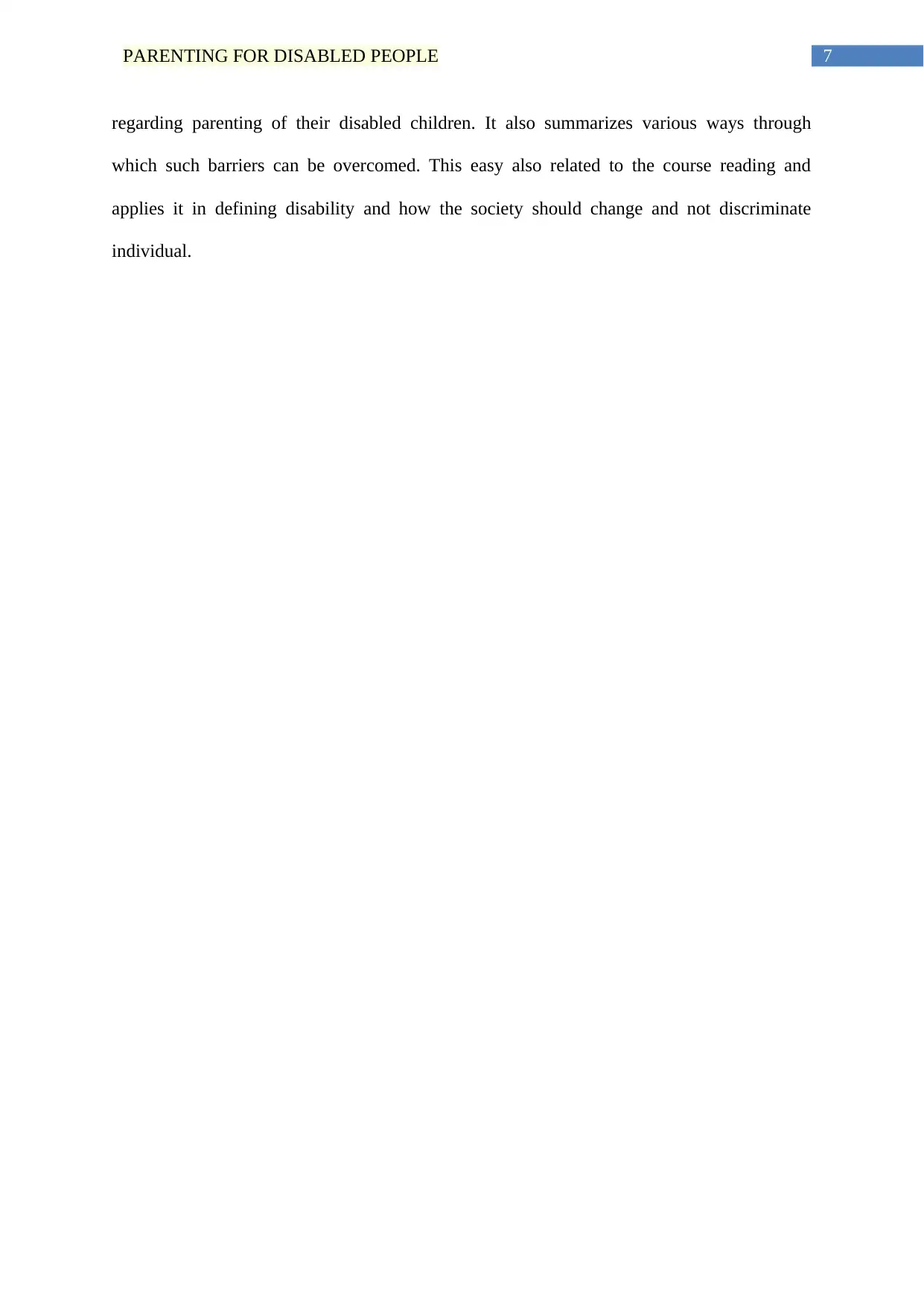
7PARENTING FOR DISABLED PEOPLE
regarding parenting of their disabled children. It also summarizes various ways through
which such barriers can be overcomed. This easy also related to the course reading and
applies it in defining disability and how the society should change and not discriminate
individual.
regarding parenting of their disabled children. It also summarizes various ways through
which such barriers can be overcomed. This easy also related to the course reading and
applies it in defining disability and how the society should change and not discriminate
individual.
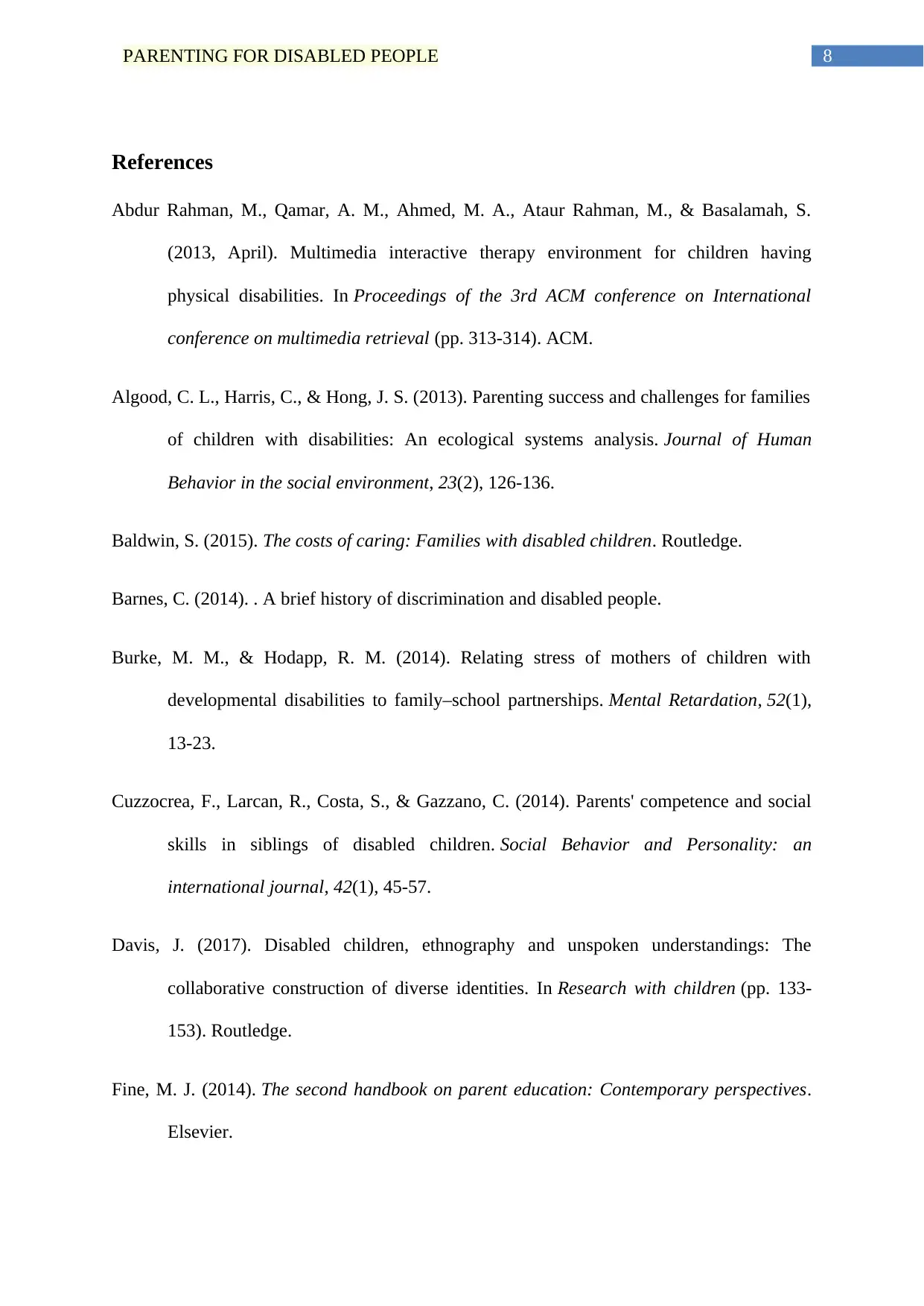
8PARENTING FOR DISABLED PEOPLE
References
Abdur Rahman, M., Qamar, A. M., Ahmed, M. A., Ataur Rahman, M., & Basalamah, S.
(2013, April). Multimedia interactive therapy environment for children having
physical disabilities. In Proceedings of the 3rd ACM conference on International
conference on multimedia retrieval (pp. 313-314). ACM.
Algood, C. L., Harris, C., & Hong, J. S. (2013). Parenting success and challenges for families
of children with disabilities: An ecological systems analysis. Journal of Human
Behavior in the social environment, 23(2), 126-136.
Baldwin, S. (2015). The costs of caring: Families with disabled children. Routledge.
Barnes, C. (2014). . A brief history of discrimination and disabled people.
Burke, M. M., & Hodapp, R. M. (2014). Relating stress of mothers of children with
developmental disabilities to family–school partnerships. Mental Retardation, 52(1),
13-23.
Cuzzocrea, F., Larcan, R., Costa, S., & Gazzano, C. (2014). Parents' competence and social
skills in siblings of disabled children. Social Behavior and Personality: an
international journal, 42(1), 45-57.
Davis, J. (2017). Disabled children, ethnography and unspoken understandings: The
collaborative construction of diverse identities. In Research with children (pp. 133-
153). Routledge.
Fine, M. J. (2014). The second handbook on parent education: Contemporary perspectives.
Elsevier.
References
Abdur Rahman, M., Qamar, A. M., Ahmed, M. A., Ataur Rahman, M., & Basalamah, S.
(2013, April). Multimedia interactive therapy environment for children having
physical disabilities. In Proceedings of the 3rd ACM conference on International
conference on multimedia retrieval (pp. 313-314). ACM.
Algood, C. L., Harris, C., & Hong, J. S. (2013). Parenting success and challenges for families
of children with disabilities: An ecological systems analysis. Journal of Human
Behavior in the social environment, 23(2), 126-136.
Baldwin, S. (2015). The costs of caring: Families with disabled children. Routledge.
Barnes, C. (2014). . A brief history of discrimination and disabled people.
Burke, M. M., & Hodapp, R. M. (2014). Relating stress of mothers of children with
developmental disabilities to family–school partnerships. Mental Retardation, 52(1),
13-23.
Cuzzocrea, F., Larcan, R., Costa, S., & Gazzano, C. (2014). Parents' competence and social
skills in siblings of disabled children. Social Behavior and Personality: an
international journal, 42(1), 45-57.
Davis, J. (2017). Disabled children, ethnography and unspoken understandings: The
collaborative construction of diverse identities. In Research with children (pp. 133-
153). Routledge.
Fine, M. J. (2014). The second handbook on parent education: Contemporary perspectives.
Elsevier.
⊘ This is a preview!⊘
Do you want full access?
Subscribe today to unlock all pages.

Trusted by 1+ million students worldwide
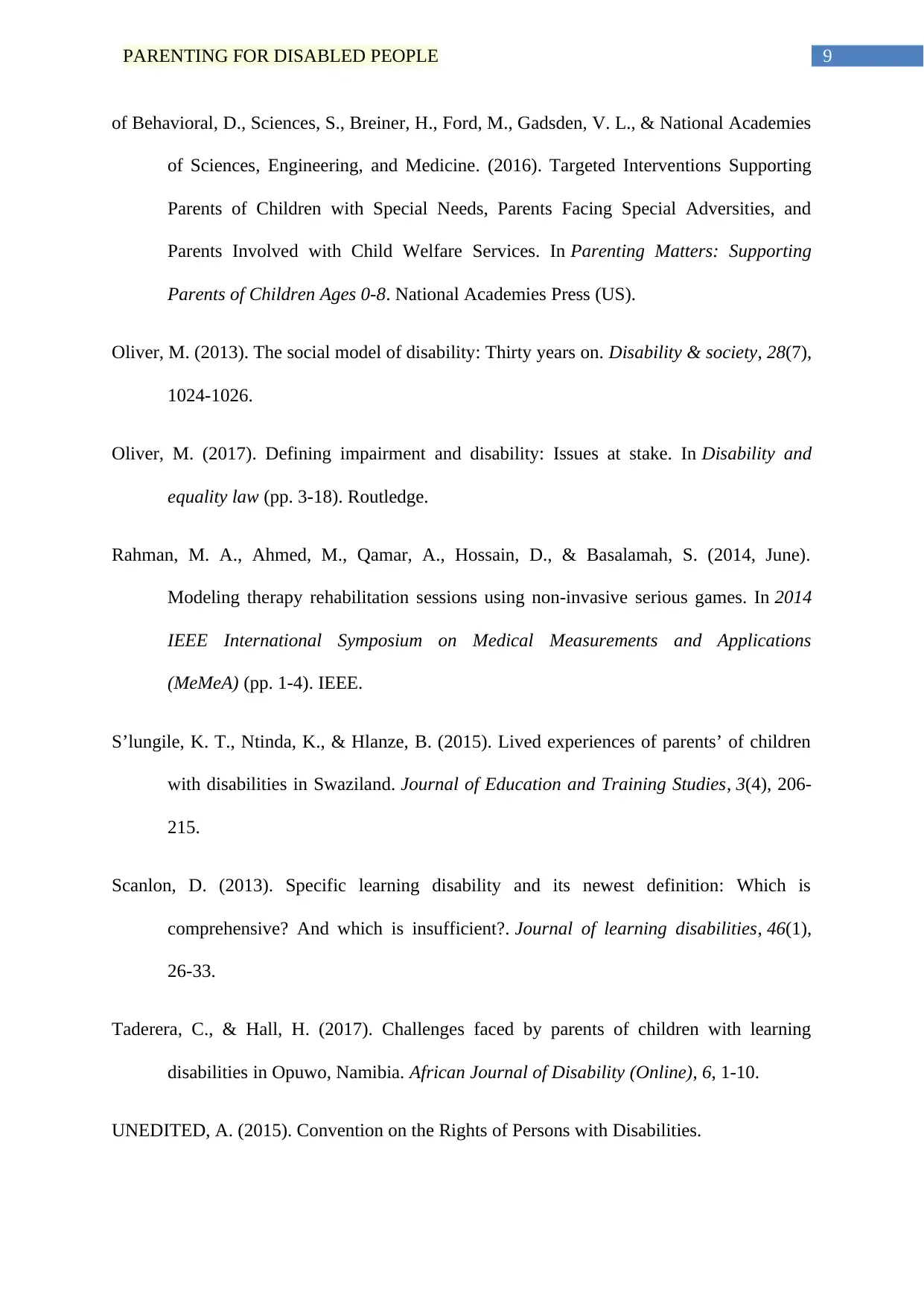
9PARENTING FOR DISABLED PEOPLE
of Behavioral, D., Sciences, S., Breiner, H., Ford, M., Gadsden, V. L., & National Academies
of Sciences, Engineering, and Medicine. (2016). Targeted Interventions Supporting
Parents of Children with Special Needs, Parents Facing Special Adversities, and
Parents Involved with Child Welfare Services. In Parenting Matters: Supporting
Parents of Children Ages 0-8. National Academies Press (US).
Oliver, M. (2013). The social model of disability: Thirty years on. Disability & society, 28(7),
1024-1026.
Oliver, M. (2017). Defining impairment and disability: Issues at stake. In Disability and
equality law (pp. 3-18). Routledge.
Rahman, M. A., Ahmed, M., Qamar, A., Hossain, D., & Basalamah, S. (2014, June).
Modeling therapy rehabilitation sessions using non-invasive serious games. In 2014
IEEE International Symposium on Medical Measurements and Applications
(MeMeA) (pp. 1-4). IEEE.
S’lungile, K. T., Ntinda, K., & Hlanze, B. (2015). Lived experiences of parents’ of children
with disabilities in Swaziland. Journal of Education and Training Studies, 3(4), 206-
215.
Scanlon, D. (2013). Specific learning disability and its newest definition: Which is
comprehensive? And which is insufficient?. Journal of learning disabilities, 46(1),
26-33.
Taderera, C., & Hall, H. (2017). Challenges faced by parents of children with learning
disabilities in Opuwo, Namibia. African Journal of Disability (Online), 6, 1-10.
UNEDITED, A. (2015). Convention on the Rights of Persons with Disabilities.
of Behavioral, D., Sciences, S., Breiner, H., Ford, M., Gadsden, V. L., & National Academies
of Sciences, Engineering, and Medicine. (2016). Targeted Interventions Supporting
Parents of Children with Special Needs, Parents Facing Special Adversities, and
Parents Involved with Child Welfare Services. In Parenting Matters: Supporting
Parents of Children Ages 0-8. National Academies Press (US).
Oliver, M. (2013). The social model of disability: Thirty years on. Disability & society, 28(7),
1024-1026.
Oliver, M. (2017). Defining impairment and disability: Issues at stake. In Disability and
equality law (pp. 3-18). Routledge.
Rahman, M. A., Ahmed, M., Qamar, A., Hossain, D., & Basalamah, S. (2014, June).
Modeling therapy rehabilitation sessions using non-invasive serious games. In 2014
IEEE International Symposium on Medical Measurements and Applications
(MeMeA) (pp. 1-4). IEEE.
S’lungile, K. T., Ntinda, K., & Hlanze, B. (2015). Lived experiences of parents’ of children
with disabilities in Swaziland. Journal of Education and Training Studies, 3(4), 206-
215.
Scanlon, D. (2013). Specific learning disability and its newest definition: Which is
comprehensive? And which is insufficient?. Journal of learning disabilities, 46(1),
26-33.
Taderera, C., & Hall, H. (2017). Challenges faced by parents of children with learning
disabilities in Opuwo, Namibia. African Journal of Disability (Online), 6, 1-10.
UNEDITED, A. (2015). Convention on the Rights of Persons with Disabilities.
1 out of 10
Related Documents
Your All-in-One AI-Powered Toolkit for Academic Success.
+13062052269
info@desklib.com
Available 24*7 on WhatsApp / Email
![[object Object]](/_next/static/media/star-bottom.7253800d.svg)
Unlock your academic potential
Copyright © 2020–2026 A2Z Services. All Rights Reserved. Developed and managed by ZUCOL.





